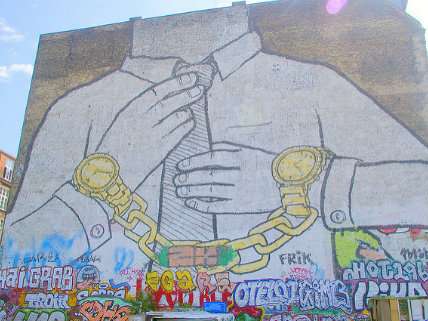Cuomo Scholarship Turns Golden Door Into Golden Handcuffs
It's not clear that Cuomo's plan for a scholarship clawback is even constitutional.

"Give me your tired, your poor, Your huddled masses yearning to breathe free,"—but once you arrive in New York, don't dare try moving somewhere else, or Gov. Andrew Cuomo will be chasing you to take back your college scholarship money. Leave it to Cuomo to transform what Emma Lazarus's poem at the base of the Statue of Liberty called the "golden door" into a modern version of golden handcuffs.
Cuomo's new "Excelsior Scholarships," included in the recently passed New York state budget, require students to live and work in the Empire State for as many years following graduation as they received the scholarship.
Cuomo's press release doesn't say how this requirement will be enforced.
Maybe he will make like Donald Trump and build a physical wall around the state to keep the scholarship-winning graduates in.
Perhaps he will ask New York's representatives in Congress to pass a "Fugitive Scholarship-Winner Act," compelling to other states to capture and return any scholarship winner who ventures beyond New York's boundaries.
The point was touched on recently by a New York Times columnist, David Brooks, in his article memorably headlined, "The Cuomo College Fiasco." Brooks had a long list of reasons that the scholarships were counterproductive and ill-conceived. But the one that caught my eye was his concern that scholarship recipients "won't be able to seize out-of-state opportunities during the crucial years when their career track is being formed. They'll be trapped in a state with one really expensive city, and other regions where good jobs are scarce."
If Cuomo had succeeded as governor, he'd be confident that recent graduates would want to stay in the state without either being bribed by a scholarship or being threatened to have to pay it back. Massachusetts, for example, grants a somewhat similar, four-year, tuition-free John and Abigail Adams Scholarship without any such demand that recipients remain in the state for years after graduation.
The sad reality is, though, that New Yorkers are fleeing in droves. I'm one of those who left, saying goodbye to New York and Gov. Cuomo in 2013 after 15 years in the state. I was able to escape the state without devastating personal financial consequences, which is more than can be said for the Excelsior Indentured Servants, er, "scholarship recipients."
One can't blame Cuomo, who became governor January 1, 2011, for identifying population loss in his state as a problem on which to focus. From 2010 to 2016, the population of Texas grew 10.8 percent, or more than 2 million. Florida's population grew 9.6 percent, about 1.8 million people, during those six years. Even high-tax California's population grew 5.4 percent, about 2 million people, during the same period. Massachusetts, where I moved to from New York, saw its population grow 4 percent, or about 250,000 people.
During the same time span, New York's population grew a paltry 1.9 percent.
It's not clear that Cuomo's plan for a scholarship clawback is even constitutional. A professor at the University of Chicago Law School, Daniel J. Hemel, floated the question of whether the stay-in-New York requirement risks violating something called the "Dormant Commerce Clause," a restriction implied by the Commerce Clause of the Constitution and limiting the states from erecting their own obstacles to interstate commerce.
As an ideological matter, the idea that government assistance comes with conditions isn't necessarily problematic. Republicans and Clinton Democrats alike supported work requirements for able-bodied welfare recipients. Scholarships for students in the Reserve Officers' Training Corps come with agreements for military service after graduation.
But New York has long been a gateway to the rest of America, not a dead end. It was, after all, a New York newspaper editor, Horace Greeley, who advised, "Go West!"
What if an Excelsior scholarship recipients wins a Rhodes or Marshall scholarship for graduate study overseas, or is moved by patriotism to enlist in the U.S. army in wartime, or wants to join the Peace Corps, or falls in love with a student from somewhere else? Cuomo's college scholarships are ostensibly intended to help students by unshackling them from onerous debt. By locking the scholarship recipients up inside the state's borders, the governor just swaps in his own version of chains.


Show Comments (20)